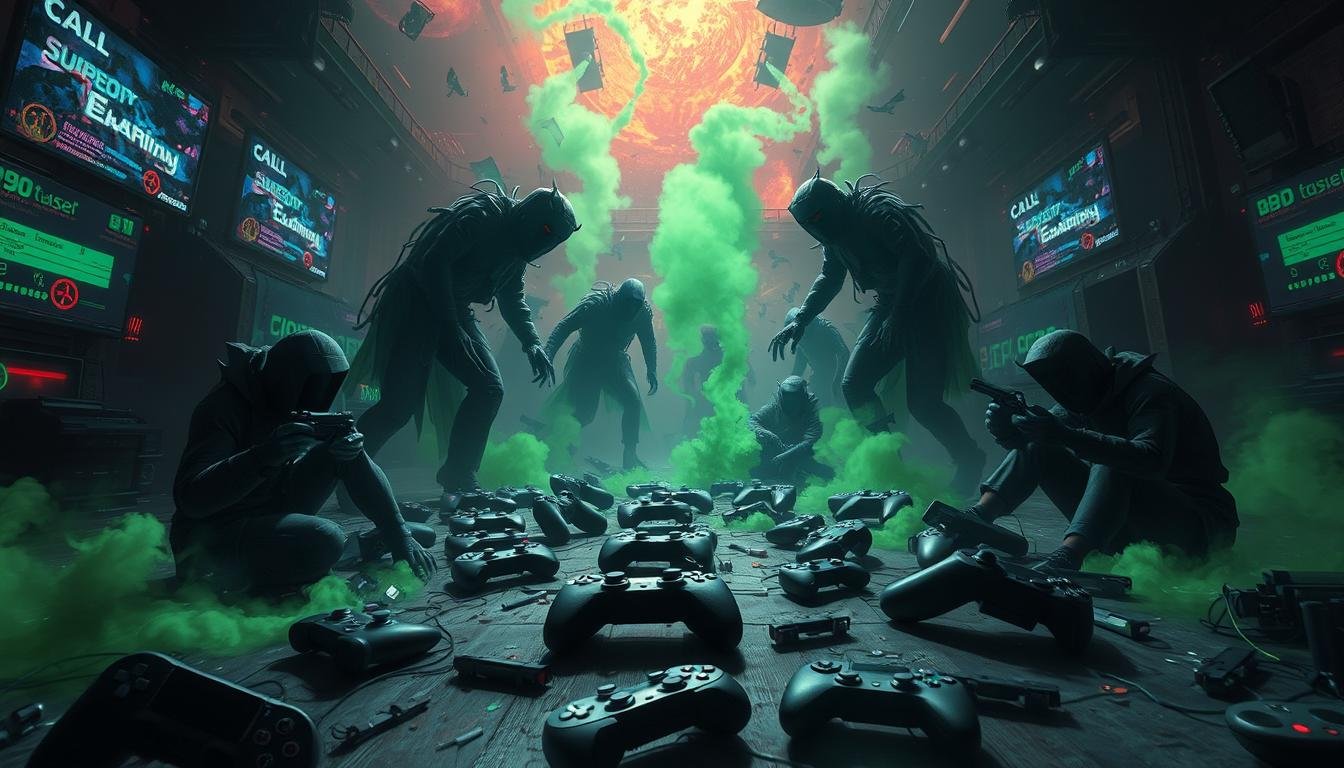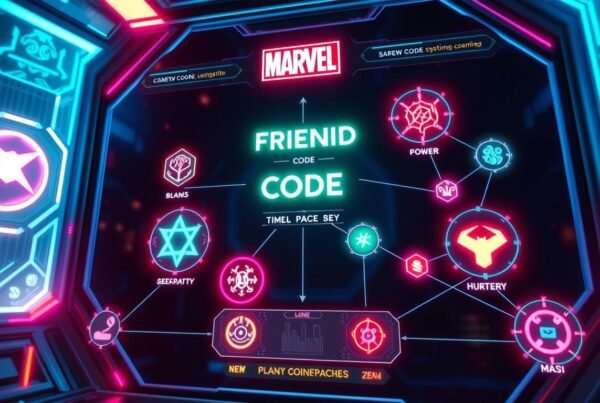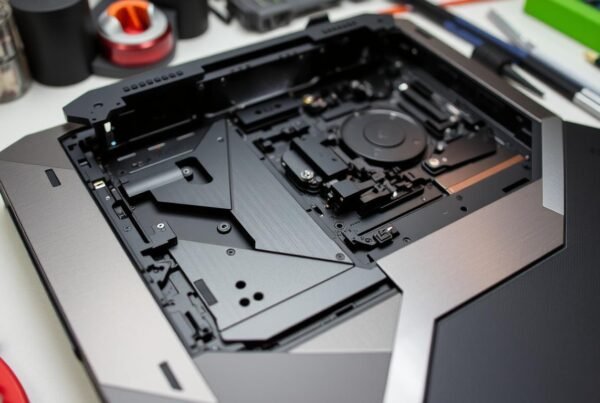What makes some gaming communities toxic? How can we spot the worst ones? Toxic gaming culture is a big problem, causing many players to face online harassment. The worst communities lack moderation and have a culture that accepts insults.
Toxic behavior can really hurt players, causing stress and mental health issues. We need to make gaming spaces better and more welcoming. Toxic communities often form in competitive games, where winning is everything. Issues like racism and sexism also make gaming feel unwelcoming.
Contents
- 1 Understanding Gaming Community Toxicity: An Overview
- 2 The Psychology Behind Toxic Gaming Behavior
- 3 Identifying the Most Toxic Gaming Communities
- 4 The Role of Game Design in Fostering Toxicity
- 5 Impact of Toxic Gaming Environments on Mental Health
- 6 How Game Developers Address Community Toxicity
- 7 Tools and Strategies for Dealing with Toxic Players
- 8 Building Positive Gaming Communities
- 9 The Role of Content Creators in Shaping Gaming Culture
- 10 Legal and Ethical Considerations in Gaming Toxicity
- 11 Conclusion: Creating a Better Gaming Future
- 12 FAQ
- 12.1 What are the most toxic gaming communities and how can I avoid them?
- 12.2 What is toxic gaming behavior and how does it affect player experience?
- 12.3 What role does game design play in fostering toxicity in online gaming communities?
- 12.4 How can I deal with toxic players in online games?
- 12.5 What are the psychological effects of toxic gaming environments on players?
- 12.6 How can game developers address community toxicity and promote positive behavior?
- 12.7 What role do content creators play in shaping gaming culture and promoting positive behavior?
- 12.8 What are the legal and ethical considerations in gaming toxicity, and how can they be addressed?
- 12.9 How can I build a positive gaming community and promote positive behavior among players?
Key Takeaways
- Toxic behavior is a big problem in gaming, affecting over 80% of multiplayer gamers.
- The worst gaming communities lack moderation and accept insults.
- Toxic behavior can harm players’ mental health and make them leave games.
- Racism, sexism, and discrimination make gaming spaces feel unwelcoming.
- We need to make gaming more positive and inclusive to fight toxicity.
- Good moderation, clear rules, and awareness can help reduce toxicity.
- Encouraging positive behavior can also make gaming better.
Understanding Gaming Community Toxicity: An Overview
Gaming community toxicity is a big problem in online gaming. It makes the game experience bad, causing stress and making players leave. The internet’s anonymity lets players say harmful things without worry.
Studies say toxic behavior in gaming comes from being anonymous online. This makes players act without thinking about others. It affects how well players do, making them feel lonely and unhappy.
Defining Toxic Behavior in Gaming
Toxic behavior in gaming includes yelling, bullying, and excluding others. Female players face a lot of abuse, getting up to three times more than men. Gaming has mostly been for young, white men, leaving others out.
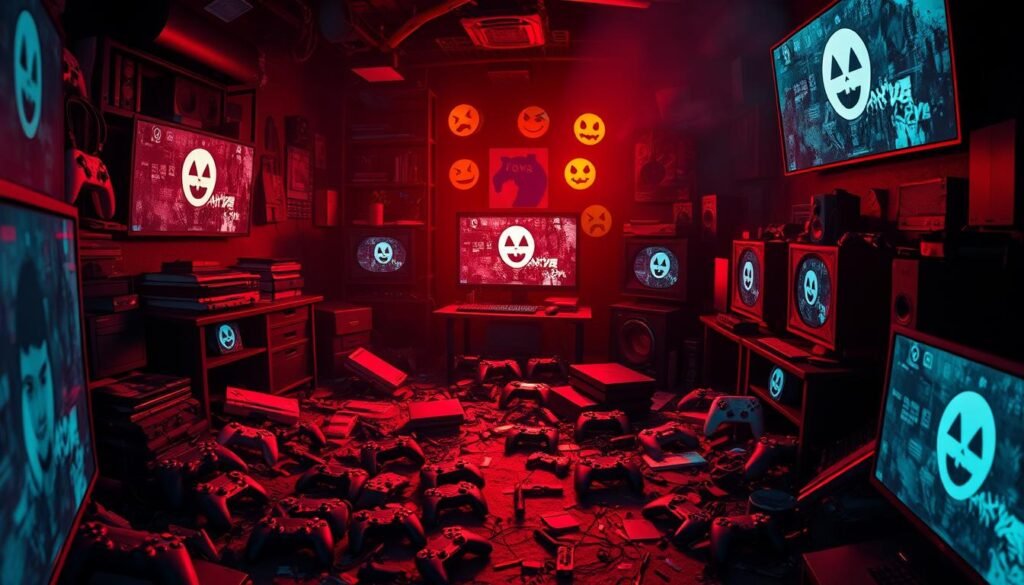
The Evolution of Online Gaming Culture
Online gaming culture has changed a lot. Free games and growing communities have helped it grow. But, this growth has also brought more bad behavior. Knowing why this happens is key to making gaming better.
Impact on Player Experience
Toxic gaming communities hurt players a lot. They feel stressed, lonely, and unhappy. To make gaming better, we need to tackle the root causes of bad behavior. This way, everyone can enjoy gaming, no matter who they are.
The Psychology Behind Toxic Gaming Behavior
The psychology of toxic gaming is complex. It’s influenced by things like anonymity, social identity, and group dynamics. Anonymity in online environments makes it easier for people to act out, even if they’re not completely hidden. This can cause a gap between what someone shows online and how they really behave.
Shawn Riker, a Licensed Family Therapist, says entitlement and immediate gratification fuel toxic gaming. The limbic system is also involved, showing that toxic actions often lack thought. Riker believes teaching personal empowerment could help make gaming more civil.
Some main reasons for toxic behavior in gaming are:
- Online harassment of game developers and players
- Death threats and bad messages on social media
- Tribalism in gaming communities, leading to strong loyalty to certain groups
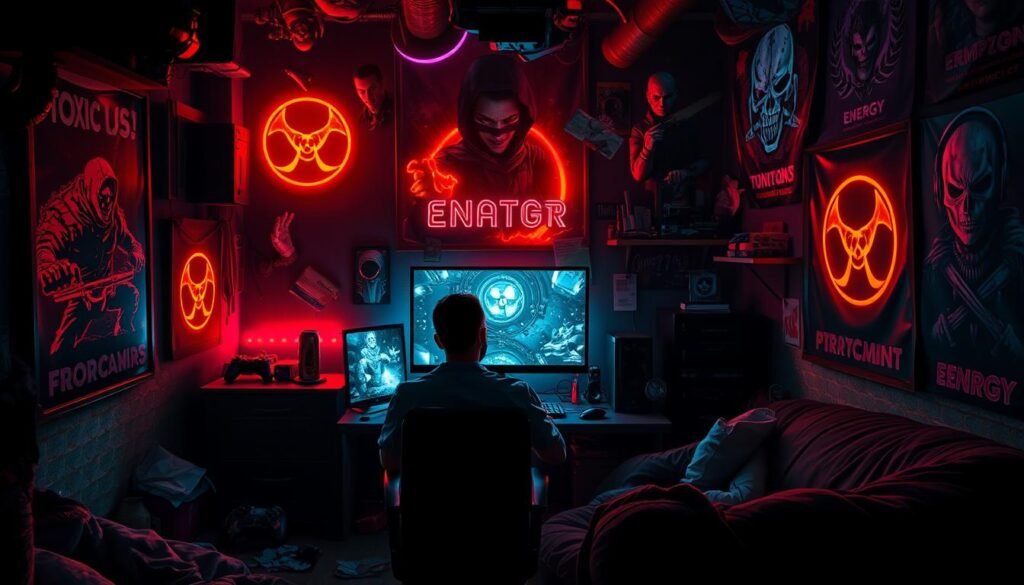
It’s important to understand why toxic gaming happens. By knowing what causes it, we can work towards a better gaming world. We aim for a place where everyone is respected and included.
| Factor | Description |
|---|---|
| Anonymity | Enables toxic behavior despite users not being entirely anonymous |
| Entitlement and immediate gratification | Drives toxic gaming behavior, according to Licensed Family Therapist Shawn Riker |
| Tribalism in gaming communities | Leads to strong loyalty to certain groups, sometimes resulting in aggressive behaviors towards differing opinions |
Identifying the Most Toxic Gaming Communities
Gaming communities can be filled with toxic behavior. Some places are worse than others when it comes to harassment and negativity. To find the most toxic ones, we need to look for warning signs and types of toxic behavior.
Research shows that 60% of gamers want to play in a more positive environment. They prefer games where everyone is friendly and relaxed.
Games like CS2, League of Legends, and Call of Duty are known for their toxic communities. These places often see behaviors like discrimination, harassment, and verbal abuse. The competitive nature of these games makes things worse, with players pushing hard to win.
Common Types of Toxic Behavior
- Verbal abuse towards teammates due to competitive drive, as seen in League of Legends
- Discrimination and harassment, such as racial slurs and death threats, as experienced in Call of Duty
- Griefing and trolling, which can lead to frustration and aggression towards teammates, as observed in Dota 2
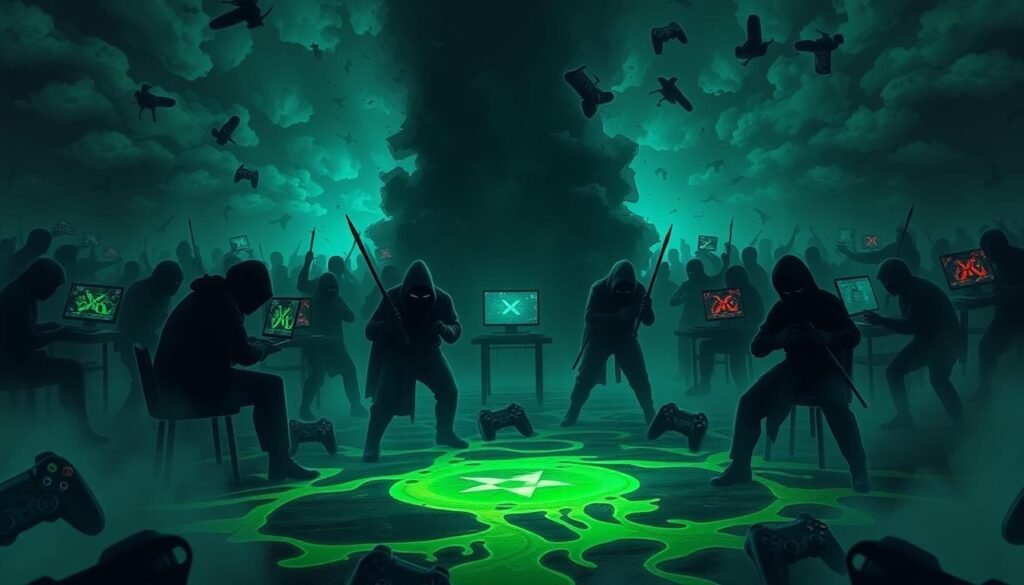
Warning Signs of a Toxic Environment
Signs of a toxic environment include aggression, verbal abuse, and harassment. Players from countries like Russia and Ukraine tend to be more toxic. The anonymity of online platforms also makes things worse.
The Role of Game Design in Fostering Toxicity
Poor game design plays a big role in the growing toxicity in gaming. Game mechanics and community features can either help or hurt. For example, games like Counter Strike: Global Offensive (CS:GO) are very competitive, leading to a toxic atmosphere. But games like Deep Rock Galactic (DRG) promote teamwork and friendship among players.
A well-designed game can make players work together better. It can also make them communicate and respect each other more. But, games like Overwatch have design issues that make players frustrated. For example, the role queue system can cause conflicts.
Some things that make games toxic include:
- Competitive game modes that encourage aggressive behavior
- Lack of effective communication tools
- Insufficient penalties for toxic behavior
- Reward systems that prioritize individual performance over teamwork
Developers can make games better by focusing on positive interactions. They can add features that encourage teamwork and provide good communication tools. They should also have fair rules for dealing with toxic behavior.
Impact of Toxic Gaming Environments on Mental Health
Toxic gaming environments can harm mental health. Studies show that too much gaming can cause stress, anxiety, and depression in teens. Physical health issues like eye strain and obesity can also arise from gaming for long hours without breaks.
Teenagers who game alone less often hang out with parents and friends. This can make them feel lonely and disconnected. Bad online interactions, like cyberbullying, can cause sleep issues, stress, and anxiety.
Psychological Effects
Toxic gaming can have serious psychological effects. Some common ones are:
- Increased stress and anxiety
- Depression and loneliness
- Aggressive behavior and less empathy for real-world violence
- Sleep problems and fatigue
Social Consequences
Toxic gaming can also harm social life. Some common effects are:
- Reduced social connections and relationships
- Increased feelings of loneliness and isolation
- Decreased empathy and compassion for others
We need to support positive mental health in gaming communities. It’s crucial to help gamers dealing with the negative effects of toxic gaming environments.
How Game Developers Address Community Toxicity
Game developers are key in tackling community toxicity. It can harm the player experience and the gaming industry’s image. They use strategies like setting clear rules, using moderation tools, and encouraging players to report bad behavior.
The gaming world has grown fast, drawing in millions of players from all walks of life. But this growth has also brought more toxicity. This can hurt players’ mental health and make games less fun. Developers must act quickly to tackle this issue to keep players engaged and the industry’s image strong.
Some developers have made their communities better by encouraging good behavior. They reward players for being kind, offer incentives for positive actions, and make everyone feel welcome. By tackling toxicity in many ways, developers can make games more enjoyable for everyone.
Here are some main ways developers can fight community toxicity:
- Using good moderation tools and reporting systems
- Setting clear rules and consequences for bad behavior
- Encouraging positive actions and player involvement
- Building a sense of community and inclusivity
Tools and Strategies for Dealing with Toxic Players
Dealing with toxic players is a big challenge in online gaming. Game developers and players can use many tools and strategies. Reporting systems are key to spotting and fixing toxic behavior. They let players report harassment or abuse, so moderators can act fast.
Communication filters are also important. They block bad language and hate speech. This makes games safer and more fun for everyone. Community management tools help too. They let moderators keep an eye on and manage online chats.
- Implementing robust reporting systems to identify and address toxic behavior
- Using communication filters to block abusive content
- Utilizing community management tools to promote positive behavior and reduce toxicity
By using these tools, game makers and players can make online gaming better. They can lessen the harm from toxic players and make games more enjoyable for everyone.
Building Positive Gaming Communities
Creating positive gaming communities is key for a fun and healthy gaming life. This happens through community building like hosting events, showing positive behavior, and talking openly among players.
Here are some ways to build a positive gaming community:
- Make clear rules and stick to them
- Show off positive role models
- Encourage everyone to talk and share thoughts
- Teach about the bad effects of toxic behavior
Using these methods, gaming communities can become places where everyone feels welcome and valued. This makes gaming more fun and strengthens the community bond.
Studies show that positive gaming communities really help players feel happy and stay longer. By focusing on community building and positive behavior, both game makers and players can make gaming better for everyone.
| Strategy | Benefits |
|---|---|
| Establishing clear community guidelines | Reduces toxic behavior, promotes positive behavior |
| Promoting positive role models | Encourages positive behavior, fosters a sense of community |
| Encouraging open communication | Resolves conflicts, promotes positive behavior |
The Role of Content Creators in Shaping Gaming Culture
Content creators have a big impact on gaming culture, reaching millions of gamers worldwide. YouTube, Twitch, and Facebook Gaming have helped create a new group of influencers. These influencers are key in promoting games, sharing tips, and building a gaming community.
As influencer responsibility grows, it’s key for content creators to promote good behavior and reduce bad vibes in gaming. This makes gaming more welcoming and fun for everyone. Their influence is clear in shaping community norms and behavior, with many gamers seeing them as role models.
Community Leadership
Good community leadership is vital for a positive gaming community. Content creators can lead by promoting positive content, engaging with their audience, and encouraging feedback. This builds a loyal fan base and positively shapes gaming culture.
Positive Content Creation
Creating positive content is crucial for a healthy gaming environment. Creators should focus on gaming culture and make content that’s fun and informative. This helps reduce negativity and fosters a sense of belonging among gamers.
The numbers show influencers’ power: they boost game sales by 35%, keep players by 28%, and boost community engagement by 42%. As gaming evolves, the role of content creators in shaping culture will grow too.
| Platform | Monthly Active Users |
|---|---|
| Twitch | 140 million |
| YouTube Gaming | 100 billion watch time hours annually |
| Facebook Gaming | 500 million |
Understanding content creators’ impact on gaming culture helps us strive for a better gaming space. As gaming evolves, it’s crucial for creators to take influencer responsibility seriously. They must promote positive behavior in the gaming world.
Legal and Ethical Considerations in Gaming Toxicity
Gaming toxicity is a complex issue. It raises several legal considerations, like protecting players from harassment and hate speech. Ethical considerations are also key, as they help promote positive behavior and reduce toxicity. The impact of gaming toxicity on players’ mental and physical health is a big concern.
Some key issues related to gaming toxicity include:
- Harassment and hate speech
- Player protection and safety
- Legal considerations surrounding loot boxes and in-game purchases
- Ethical considerations related to inclusivity and diversity in gaming
Game developers and players must work together to address gaming toxicity. This means implementing legal considerations like reporting systems and moderation tools. It also involves ethical considerations such as creating inclusive narratives and characters.
By taking a proactive approach to addressing gaming toxicity, we can make gaming safer and more enjoyable for everyone.
Conclusion: Creating a Better Gaming Future
We all want a better gaming future. To get there, we need to focus on building positive gaming communities. It’s key to reduce toxicity by promoting respect and encouraging players to report bad behavior.
Recent stats show that 96% of players deal with toxicity by blocking users, leaving the game, or reporting incidents. The gaming industry can shape the future of online interactions. By protecting users and promoting inclusivity, game developers can make games better for everyone.
Creating a positive gaming future is possible when we all contribute. It starts with our individual actions and choices. With more players facing toxic behavior, we must learn from each other to make a change.
This change is based on respect, empathy, and inclusivity. In this future, players can enjoy their games without fear of harassment or toxicity. Let’s work together to make this future a reality.


